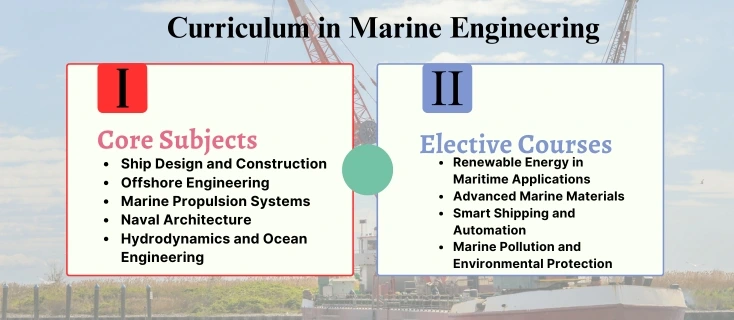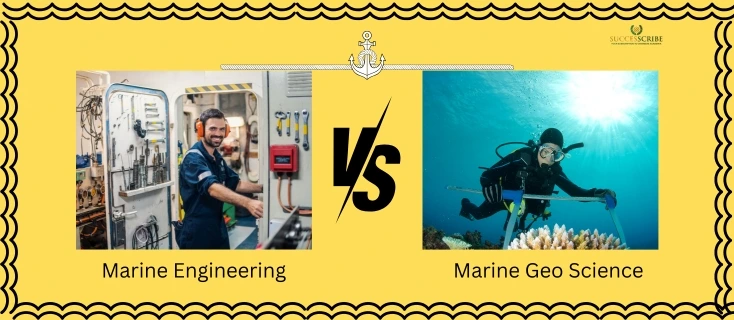If you are someone who has a passion for the sea, an unyielding curiosity about ships, and a keen interest in engineering marvels, then marine engineering might just be the perfect career path for you. As a marine engineer, you become part of a fascinating world that bridges technology and the ocean. When it comes to pursuing a degree in marine engineering, Germany emerges as an unparalleled destination.
Studying marine engineering in Germany is an experience that equips students with skills to excel in this dynamic field. In this topic, we will explore why Germany is an exceptional choice for marine engineering, the benefits of studying this discipline in the country, top universities offering marine engineering programs, the eligibility criteria, and career prospects.
Global Demand for Marine Engineers
Masters in Marine Engineering in Germany is booming, According to recent industry reports:
- The global shipbuilding market is projected to grow by 4.5% annually by 2030.
- Offshore wind energy projects are creating thousands of jobs for marine engineers.
- Emerging markets like Southeast Asia and Africa are increasing their demand for maritime expertise.
Admission Requirements
Here is the Admission Requirements for Masters in Marine Engineering in Germany
General Eligibility Criteria
- Bachelor’s Degree: Undergraduate degree in the Engineering field. Mostly Mechanical Engineering background.
- APS Certificate: Mandatory to study in German University
- Academic Performance: A minimum GPA of 3.0 on a 4.0 scale or equivalent.
- Language Proficiency:
| English Taught Programs | IELTS (minimum 6.5) and TOEFL (minimum 90) |
| German Taught Programs | TestDaF or Goethe Certification (B2) |
- GRE/GMAT: Some universities may require GRE scores for admission.
- Work Experience: Preferred but not mandatory for most programs.
Required Documents
- Academic transcripts
- Statement of Purpose (SOP)
- Letter(s) of Recommendation
- Updated CV/Resume
- Language proficiency test scores
- Passport-sized photographs
- Passport copy
Top Universities Offering Masters in Marine Engineering in Germany
Here are the top universities offering Masters in Marine Engineering in Germany
1. University of Rostock

- Established in 1419, University of Rostock has a rich history in maritime research.
- Strong ties to the maritime industry, providing students with ample internship and research opportunities.
- The university’s faculty includes experts in naval architecture, marine engineering, and offshore technologies.
| Requirement | Details |
| Program Name | MSc Sustainable Maritime Engineering |
| Duration | 4 semesters (2 years) |
| Language of Instruction | German |
| Tuition Fees | No tuition fees for EU students; approx. €150-300 per semester for non-EU students |
| Entry Requirement | Goethe Certificate: B2 level |
2. Technical University of Berlin (TU Berlin)

- Strong research output in maritime technology and engineering.
- Located in Berlin, a major hub for engineering and technology in Europe.
- Collaboration with maritime research institutions and industries
| Requirement | Details |
| Program Name | MSc Naval Architecture and Ocean Engineering |
| Duration | 4 semesters (2 years) |
| Language of Instruction | English |
| Tuition Fees | €500 per semester |
| Entry Requirement | IELTS: 6 BAND |
3. Hochschule Bremen

Located in the vibrant port city of Bremen, HS Bremen is one of Germany’s leading universities for applied sciences. Known for its strong emphasis on practical learning, the university offers a range of programs in engineering, business, and the maritime sector.
| Requirement | Details |
| Program Name | M.Eng Naval Architecture and Ocean Engineering |
| Duration | 3-4 semesters (1.5-2 years) |
| Language of Instruction | English |
| Tuition Fees | No tuition fees for EU students; approx. €250-350 per semester for non-EU students |
| Entry Requirement | IELTS: 7 bandGoethe: B2 level |
4. Hamburg University of Technology

Hamburg University of Technology (TUHH) is one of Germany’s top engineering universities, located in Hamburg, a major global port city.
| Requirement | Details |
| Program Name | MSc Naval Architecture and Ocean Engineering |
| Duration | 4 semester |
| Language of Instruction | German/ English |
| Tuition Fees | €300 per semester administrative fee |
| Entry Requirement | Bachelors DegreeIELTS – 7 bandGoethe – B2 level |
Curriculum Overview

A master’s program in marine engineering typically covers the following areas:
Core Subjects
- Ship Design and Construction
- Offshore Engineering
- Marine Propulsion Systems
- Naval Architecture
- Hydrodynamics and Ocean Engineering
Elective Courses
- Renewable Energy in Maritime Applications
- Advanced Marine Materials
- Smart Shipping and Automation
- Marine Pollution and Environmental Protection
Research and Thesis
- Most programs require students to undertake a research project or thesis in the final semester.
- Topics often align with industry needs, providing valuable hands-on experience.
Cost of Studying Marine Engineering in Germany
Cost of Studying Masters in Marine Engineering in Germany is pretty affordable other countries, Here are some of the factors like Tuition Fees, Living Expense and other which should be considered while planning to study in Germany.
Tuition Fees
| Public Universities | Free or minimal fees (€0-€600 per semester). |
| Private Universities | Range between €5,000-€15,000 per semester |
Living Expenses
The average monthly cost of living for students in Germany is approximately €850-€1,200. Here is a breakdown:
| Expense | Monthly Cost (€) |
| Accommodation | 300-500 |
| Food | 150-250 |
| Transportation | 50-100 |
| Medical Insurance | 110-120 |
| Miscellaneous | 100-200 |
Scholarships
Several scholarships are available for international students when Pursuing Masters in Marine Engineering in Germany:
- DAAD Scholarships: Covers tuition fees and living expenses.
- Heinrich Böll Foundation Scholarships: For academically excellent students.
- Deutschlandstipendium: €300 per month
In addition to general scholarships, marine engineering students can apply for:
- Alfred Wegener Institute Fellowship: Supports students in marine and polar research.
- Kurt Hansen Scholarship: Offers funding for engineering students interested in applied sciences.
Marine Engineering in Germany vs Other Countries
Here is the comparison of Pursuing Marine Engineering in Germany or pursuing it from the other countries.
| Feature | Germany | USA | UK | Australia |
| Tuition Fees | Low/Free (€0-€600) | High ($15,000-$30,000) | Moderate (£10,000-£20,000) | High (AUD 20,000-40,000) |
| Industry Opportunities | Strong maritime industry | Large shipbuilding firms | Global shipping hubs | Offshore oil and gas |
| Research Facilities | Excellent | Advanced | Good | Good |
| Living Costs | Affordable (€850-€1,200) | High ($1,500-$2,500) | High (£1,000-£2,000) | High (AUD 2,000-3,000) |
Career Prospects After Masters in Marine Engineering
Germany offers a job-seeker visa for graduates to find employment post-studies. Strong demand for marine engineers due to Germany’s advanced shipbuilding and offshore industries.
Job Roles
Graduates of marine engineering can work in the following positions:
- Marine Engineer
- Naval Architect
- Offshore Engineer
- Port Engineer
- Marine Surveyor
Average Salaries
An overview of average salaries for marine engineering roles:
| Job Role | Average Annual Salary (€) |
| Marine Engineer | 50,000-70,000 |
| Naval Architect | 55,000-75,000 |
| Offshore Engineer | 60,000 – 80,000 |
| Port Engineer | 45,000 – 65,000 |
| Marine Surveyor | 50,000 – 70,000 |
Industries Hiring Marine Engineers
- Shipbuilding Companies
- Offshore Oil and Gas Industry
- Maritime Consultancies
- Port Authorities
- Renewable Energy Sector
Specializations in Marine Engineering
A Masters in marine engineering in Germany offers opportunities to specialize in niche areas. Common specializations include:
- Ship Design and Naval Architecture: Focuses on designing efficient and sustainable ships.
- Marine Renewable Energy: Covers wave energy converters, offshore wind farms, and ocean thermal energy.
- Submarine Engineering: Involves the design and development of underwater vehicles.
- Ocean Engineering: Specializes in the construction and operation of offshore platforms and ports.
- Maritime Logistics: Focuses on supply chain and transportation systems in the maritime industry.
Latest Trends in Marine Engineering
Here are some of the aspects of the evolved Marine Engineering field.
- Autonomous Ships: With advancements in AI, autonomous vessels are becoming a reality.
- Green Shipping: Emphasis on reducing carbon emissions and adopting alternative fuels like LNG and hydrogen.
- Digital Twin Technology: Simulating ship operations to improve performance and safety
Difference Between Marine Engineering and Marine GeoScience

Marine Engineering and Marine Geoscience are distinct fields, both deeply connected to the ocean, but their focus, scope, and applications differ significantly. Below is a comparison to help understand the differences:
Marine Engineering
Marine Engineering deals with the design, construction, operation, and maintenance of ships, submarines, and other marine vessels and equipment. Primarily Focus would be technological innovations and engineering solutions for the maritime and offshore industries
Key Areas of Study in Marine Engineering
- Shipbuilding and design
- Propulsion systems (e.g., engines and turbines)
- Marine electronics and control systems
- Offshore structures (e.g., oil rigs)
- Safety systems and compliance
Career Prospects
- Marine Engineer
- Naval Architect
- Offshore Engineer
- Marine Surveyor
- Systems Engineer for maritime operations
Marine GeoScience
Marine Geoscience focuses on the study of geological and geophysical processes beneath the oceans, including the ocean floor and coastal environments. The primary focus is Understanding geological processes and ecosystems under and around oceans to address environmental and resource-related questions.
Key Areas of Study in Marine GeoScience
- Oceanography and seafloor mapping
- Tectonics and plate boundaries under oceans
- Marine sedimentology
- Natural resource exploration (e.g., oil, gas, and minerals)
- Environmental impacts on marine ecosystems
Career Prospects
- Marine Geoscientist
- Oceanographer
- Environmental Consultant
- Geophysical Data Analyst
- Resource Exploration Specialist
Marine Engineering VS Marine GeoScience
| Aspect | Marine Engineering | Marine GeoScience |
| Focus | Engineering solutions for maritime needs | Geological processes beneath oceans |
| Core Subjects | Engineering, mechanics, and systems design | Geology, oceanography, and geophysics |
| Applications | Shipbuilding, offshore structures | Geology, oceanography, and geophysics |
| Work Setting | Shipyards, offshore rigs, maritime vessels | Research vessels, labs, coastal zones |
| Objective | Enhance Maritime Technology | Understand and utilize marine geology |
Both fields are crucial to understanding and utilizing the ocean’s potential. While Marine Engineering is more technology-driven, Marine Geoscience provides insights into the Earth’s subsurface and marine environments. Depending on your passion, whether it’s engineering marvels or unraveling Earth’s geological mysteries, you can choose the field that aligns with your interests.
Alternative Study Options Related to Marine Engineering
If you are interested in expanding your knowledge, you can explore related master’s programs in Germany:
- MSc in Mechanical Engineering with a focus on Maritime Applications
- MSc in Oceanography
- MSc in Offshore and Coastal Engineering
- MSc in Environmental Engineering with Maritime Focus
Marine Engineering vs Related Fields
Students often compare marine engineering with other disciplines. Here’s a quick comparison:
| Field | Focus Area | Career Opportunities |
| Marine Engineering | Shipbuilding, propulsion systems, offshore tech | Shipyards, offshore platforms, maritime consultancies |
| Naval Architecture | Designing and constructing ships and submarines | Ship design firms, government defense projects |
| Mechanical Engineering | Broader engineering application in various sectors | Automotive, aerospace, and manufacturing industries |
| Ocean Engineering | Marine structures and coastal engineering | Environmental research, renewable energy sectors |
Application Process for Masters in Marine Engineering in Germany
Here is the step by step application process for Marine Engineering program in Germany
- Research Programs:
Identify universities and programs that align with your interests.
- Prepare Documents:
- Academic transcripts.
- APS Certificate
- English/German proficiency test scores.
- SOP, LORs, and CV.
- Submit Application:
Use university portals or platforms like uni-assist for applications.
- Await Admission Decision:
Admission decisions are usually announced 4-8 weeks after application deadlines.
- Apply for Visa:
Secure a student visa by providing proof of admission and financial resources.
Important Deadlines:
- Winter Semester: Apply by May – July.
- Summer Semester: Apply by November-January
Conclusion
Marine Engineering in Germany offers excellent opportunities for students interested in the maritime industry. With top universities offering high-quality education, industry ties, and ample career opportunities, Germany stands out as an ideal destination for aspiring marine engineers. Whether you’re interested in shipbuilding, offshore engineering, or marine environmental sustainability, pursuing Marine Engineering in Germany can open doors to a fulfilling and rewarding career.
By choosing Germany, you not only benefit from world-class education but also immerse yourself in a country that plays a leading role in global maritime trade and innovation
FAQs
Do I need to learn German?
For English-taught programs, German proficiency is not mandatory but is recommended for daily life and internships.
Are internships mandatory?
Yes, most programs include mandatory internships as part of the curriculum.
What subjects are covered in a Marine Engineering Master’s program?
Key subjects include:
1. Advanced Ship Design
2. Marine Propulsion Systems
3. Hydrodynamics and Fluid Mechanics
4. Offshore Structures
5. Marine Environmental Technology
Is marine engineering in demand?
Yes, marine engineering is a growing field with high demand in industries like shipping, offshore energy, and environmental conservation.
What makes Germany a preferred destination for Marine Engineering?
Germany’s maritime heritage, advanced research facilities, tuition-free public universities, and strong industry connections make it a top choice for Marine Engineering students
Related Post
Highly demanded jobs in Germany
Masters in Nanotechnology Engineering
Nuclear Engineering Courses in Germany
Agricultural Engineering in Germany











